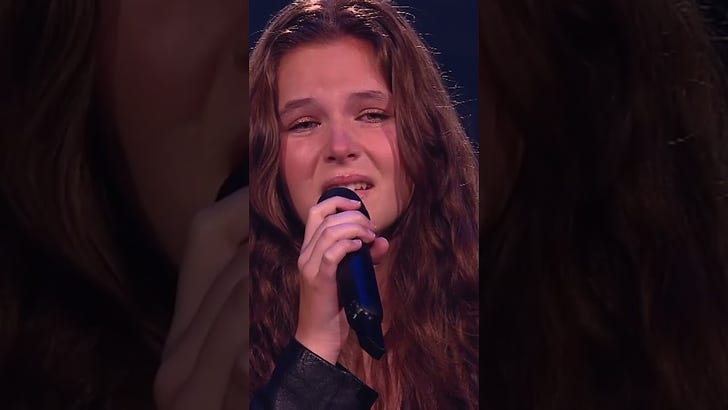Victoire de Sophie Grenier à La Voix | Sophie Grenier wins La Voix
La promesse que les Franco-Ontariens ont toujours leur mot à dire | Young songstress is the promise that Franco-Ontarians still have a voice
Sophie Grenier, superstar franco-ontarienne en herbe, est brillante, belle et bilingue. La semaine dernière, la jeune chanteuse d'Orléans, en Ontario, a remporté La Voix à TVA, un concours de téléréalité de renommée internationale.
TVA s'était déjà vanté de couronner «la voix du Québec», mais comme l'a fait remarquer la journaliste Rachel Bolduc-Crustin à ONFR+, c'est une voix franco-ontarienne qui été entendue lors de la finale de La Voix, dimanche dernier, où Mme Grenier «a profité de son passage dans une compétition majoritairement québécoise pour mettre en lumière la francophonie canadienne».
Oui. Et voilà pourquoi nous l’adorons.
Lire la suite dans Le Voyageur
Sophie Grenier wins La Voix
Young songstress is the promise that Franco-Ontarians still have a voice
Budding Franco-Ontarian superstar Sophie Grenier is bright, beautiful – and bilingual. Last week, the young songstress from Orléans, Ontario, won La Voix on TVA, Québec’s version of The Voice, the internationally acclaimed reality singing competition.
TVA once boasted that it would crown “the voice of Québec,” but as ONFR+ journalist Rachel Bolduc-Crustin shrewdly observed, it was a Franco-Ontarian voice that echoed from La Voix’s finale last Sunday where Grenier “leveraged her participation in a primarily Québécois competition to highlight Canada’s Francophonie.”
Oui. And we are here for it.
There is an important franco-cultural subtext to Grenier’s win in Québec. Like many Franco-Ontarians in la belle province, Grenier had to defend her unique parler: "when they hear my accent, people think I'm an English speaker, but my mother tongue is really French!"
"It's certain that in Quebec, they also fight for the French language,” she told ONFR+. “At the same time, they forget that in Ontario, it's not just English. That in other parts of Canada, there are not just anglophones who have learned French. There are Francophones."
But if she is setting one of Québec’s biggest stages ablaze, the young chanteuse also showed that Franco-Ontarians artists can be universal in the global stratosphere when she sang Puisque tu pars / Let’s Talk About Love during La Voix’s finale last week, a bilingual version of an anglophone song by Céline Dion.
And yet, she also sang it with her Franco-Ontarian accent, a bold and beautiful gesture, “a hope for French in Ontario” in an era where Canada’s Francophonie is in the fight of its life, faced with the cruel reality of a declining demographic dividend and the folklorisation of our language and cultures.
Grenier is a Franco-Ontarian triumph, our future, an affirmation that Nous sommes, nous serons (We are, We will be), despite centuries of history, language laws and discrimination that attempted to assimilate and acculturate Franco-Canadians into Canada’s English-speaking majority, particularly outside Québec.
“It is my mother tongue,” says Grenier. “It's the language of love. I think that French song lyrics are really poetry. I really wanted to show that I'm a Francophone, that I love the French language and that I want it to survive.”
Following in the footsteps of Franco-Ontarians Céleste Lévis and Mélissa Ouimet, who blazed a trail for Grenier on the La Voix stage in previous seasons of the show, she is a cultural affirmation that we still have a voice, that the French Fact is still alive and vibrant, inspiring us to speak French with pride – with each other, with everyone.
Her first album, says Sophie Grenier, will be en français. It’s a promise, a shining reminder that Franco-Ontarian youth are still fighting for their language. And that they will claim their peculiar and particular accents, their parler, their voice.



